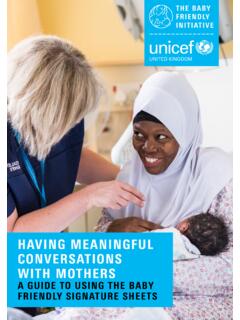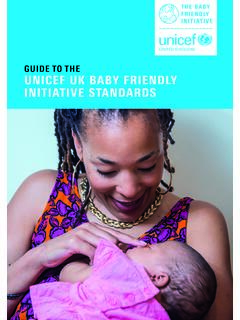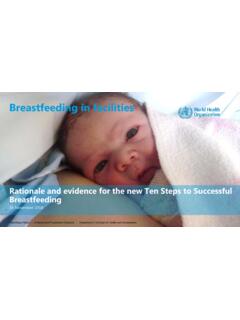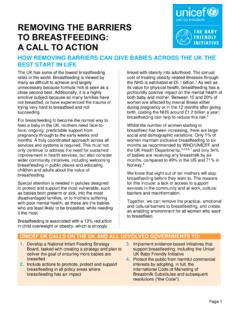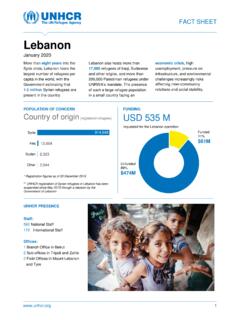Transcription of a summary of the un convention on the rights ... - UNICEF UK
1 A summary of the un convention on the rights of the childarticle 1 (definition of the child)Everyone under the age of 18 has all the rights in the 2 (non-discrimination) The convention applies to every child without discrimination, whatever their ethnicity, gender, religion, language, abilities or any other status, whatever they think or say, whatever their family 3 (best interests of the child)The best interests of the child must be a top priority in all decisions and actions that affect 4 (implementation of the convention ) Governments must do all they can to make sure every child can enjoy their rights by creating systems and passing laws that promote and protect children s 5 (parental guidance and a child s evolving capacities) Governments must respect the rights and responsibilities of parents and carers to provide guidance and direction to their child as they grow up, so that they fully enjoy their rights .
2 This must be done in a way that recognises the child s increasing capacity to make their own choices. article 6 (life, survival and development)Every child has the right to life. Governments must do all they can to ensure that children survive and develop to their full 7 ( birth registration , name, nationality, care)Every child has the right to be registered at birth , to have a name and nationality, and, as far as possible, to know and be cared for by their 8 (protection and preservation of identity)Every child has the right to an identity. Governments must respect and protect that right, and prevent the child s name, nationality or family relationships from being changed 9 (separation from parents)Children must not be separated from their parents against their will unless it is in their best interests (for example, if a parent is hurting or neglecting a child).
3 Children whose parents have separated have the right to stay in contact with both parents, unless this could cause them harm. article 10 (family reunification)Governments must respond quickly and sympathetically if a child or their parents apply to live together in the same country. If a child s parents live apart in different countries, the child has the right to visit and keep in contact with both of them. article 11 (abduction and non-return of children) Governments must do everything they can to stop children being taken out of their own country illegally by their parents or other relatives, or being prevented from returning home.
4 Article 12 (respect for the views of the child)Every child has the right to express their views, feelings and wishes in all matters affecting them, and to have their views considered and taken seriously. This right applies at all times, for example during immigration proceedings, housing decisions or the child s day-to-day home life. article 13 (freedom of expression)Every child must be free to express their thoughts and opinions and to access all kinds of information, as long as it is within the 14 (freedom of thought, belief and religion)Every child has the right to think and believe what they choose and also to practise their religion, as long as they are not stopping other people from enjoying their rights .
5 Governments must respect the rights and responsibilities of parents to guide their child as they grow up. article 15 (freedom of association)Every child has the right to meet with other children and to join groups and organisations, as long as this does not stop other people from enjoying their 16 (right to privacy)Every child has the right to privacy. The law should protect the child s private, family and home life, including protecting children from unlawful attacks that harm their 17 (access to information from the media)Every child has the right to reliable information from a variety of sources, and governments should encourage the media to provide information that children can understand.
6 Governments must help protect children from materials that could harm 18 (parental responsibilities and state assistance)Both parents share responsibility for bringing up their child and should always consider what is best for the child. Governments must support parents by creating support services for children and giving parents the help they need to raise their children. article 19 (protection from violence, abuse and neglect) Governments must do all they can to ensure that children are protected from all forms of violence, abuse, neglect and bad treatment by their parents or anyone else who looks after 20 (children unable to live with their family) If a child cannot be looked after by their immediate family, the government must give them special protection and assistance.
7 This includes making sure the child is provided with alternative care that is continuous and respects the child s culture, language and 21 (adoption)Governments must oversee the process of adoption to make sure it is safe, lawful and that it prioritises children s best interests. Children should only be adopted outside of their country if they cannot be placed with a family in their own 22 (refugee children)If a child is seeking refuge or has refugee status, governments must provide them with appropriate protection and assistance to help them enjoy all the rights in the convention .
8 Governments must help refugee children who are separated from their parents to be reunited with them. article 23 (children with a disability)A child with a disability has the right to live a full and decent life with dignity and, as far as possible, independence and to play an active part in the community. Governments must do all they can to support disabled children and their families. article 24 (health and health services)Every child has the right to the best possible health. Governments must provide good quality health care, clean water, nutritious food, and a clean environment and education on health and well-being so that children can stay healthy.
9 Richer countries must help poorer countries achieve 25 (review of treatment in care)If a child has been placed away from home for the purpose of care or protection (for example, with a foster family or in hospital), they have the right to a regular review of their treatment, the way they are cared for and their wider circumstances. article 26 (social security)Every child has the right to benefit from social security. Governments must provide social security, including financial support and other benefits, to families in need of 27 (adequate standard of living)Every child has the right to a standard of living that is good enough to meet their physical and social needs and support their development.
10 Governments must help families who cannot afford to provide 28 (right to education)Every child has the right to an education. Primary education must be free and different forms of secondary education must be available to every child. Discipline in schools must respect children s dignity and their rights . Richer countries must help poorer countries achieve 29 (goals of education)Education must develop every child s personality, talents and abilities to the full. It must encourage the child s respect for human rights , as well as respect for their parents, their own and other cultures, and the 30 (children from minority or indigenous groups)Every child has the right to learn and use the language, customs and religion of their family, whether or not these are shared by the majority of the people in the country where they 31 (leisure, play and culture)Every child has the right to relax, play and take part in a wide range of cultural and artistic 32 (child labour)
